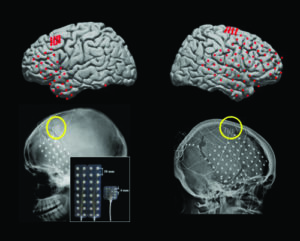Our thoughts are our experience in this world, and our worries, memories, and plans are the only real testimony to our existence. Moment by moment, it feels like we are thinking about what’s naturally important, but in reality we each focus only on a minuscule subset. Equally surprising is that we dwell on different subsets from those around us—each of us lives a unique internal life. Our thoughts are partially under our control and partially not, but they are all we really have, and they just pass through.
The ephemeral nature of thought is even more pronounced in our nightly dreams, where our thoughts feel like simulated training based on a curriculum derived from our failures, our unresolved conflicts, and our fears. You may dream of being back in high school or that your car is sinking into a lake, and you think to yourself, “Next time I should roll down the windows before the water reaches the roof.” But most dreams are forgotten, and all of that experience, seemingly as real as our waking life, is lost.

Humanity no longer has to accept this loss. By standing on the shoulders of biomedical and machine-learning giants, DeUmbra has partnered with the University of Buda to develop a technology that tracks and writes down your thoughts. We call it ThoughtLog. ThoughtLog uses an encoder-decoder (deep neural network) to translate brain waves to text. Encoder-decoder technology is what enables automatic language translation to finally work. Computers can translate English into French by training on identical documents written in both languages. The amazing thing is that these algorithms extend beyond text. Using the same method of training, they can generate captions for images. ThoughtLog takes this one step further: instead of translating images to text, it translates brain waves into text.
We have been training ThoughtLog for over 8 years with hundreds of volunteers. The process is that we ask the volunteers to tell us what they are thinking while the University of Buda brain wave detector converts their brain waves into vector embeddings (a mathematical representation). Using these embeddings along with the text representations of what the volunteers have reported as training data, the deep learning algorithm learns to match their brain waves to their descriptions of their thoughts. The result is that ThoughtLog can convert your thoughts into text, even while you are dreaming. It’s hard to imagine that such a thing is possible. A small company in Austin Texas has cleaved human history between what is lost and what is preserved.
Even more astonishing is that DeUmbra can provide ThoughtLog for free. Using ThoughtLog requires a minor surgery to insert the brain wave detector and processor, and although medical procedures can be expensive, we are proud to offer this service at no cost for our users. All expenses of ThoughtLog are paid by our sponsors. A few times a day, our sponsors will cause ThoughtLog to generate brain waves in our users that trigger thoughts about their products and services. This functionality is possible because neural network encoder-decoder models can work in both directions, and the University of Buda brain wave detector can also trigger neurons to generate waves.[1] There will be minimal “commercial breaks” during your waking hours because many of the sponsored thoughts about products and services can be sent to you while you are sleeping.[2]
No need to worry. ThoughtLog won’t bother you about products and services that you don’t like. Our partners will note your arousal responses to sponsored thoughts and will use that information to craft messages tailored to you. In fact, by thinking positive thoughts about the products and services of our sponsors, you can even earn ThoughtPoints! ThoughtPoints can be redeemed for discounted products and services, much like airline miles can.

You can rest assured while using ThoughtLog because all of your data will be stored securely in the cloud. Being stored in the cloud means that you can give access to your loved ones. Sharing your ThoughtLog stream is yet another way to gain trust and demonstrate affection. The data will also be made available to our partners in law enforcement, which means that your use of ThoughtLog will help to make our cities safe. When a crime is committed in an area, the authorities will be able to quickly home in on a list of potential suspects. ThoughtLog also enables workforces and schools to be more effective. If you are an employer or a school administrator, please reach out to our sales people about our enterprise edition.
At DeUmbra, we care deeply about creating a more just and moral civilization. To push society forward, our customers can also earn ThoughtPoints by thinking encouraged thoughts. To stay up-to-date on what thoughts should be encouraged and discouraged, DeUmbra continually applies deep learning algorithms to analyze tweets and reactions on Twitter. Thoughts in tweets that receive many likes and retweets and responses with positive sentiment are stored as “encouraged,” and thoughts in tweets that receive little attention or responses with negative sentiment are stored as “discouraged.” By using vector similarity, ThoughtLog can compare your thoughts to our lists of encouraged and discouraged thoughts in real time. Having thoughts that are similar to those on our encouraged list will earn you ThoughtPoints, and our customers will become better people because having discouraged thoughts will not only deduct ThoughtPoints, such thoughts will cause ThoughtLog to trigger brain waves that result in moderate, but physically harmless, pain.
Our customers will also earn ThoughtPoints for any useful intellectual property they create while using ThoughtLog. Customers won’t have the burden of owning the ideas they generate, but they will instead receive ThoughtPoints if their thoughts are useful to our sponsors. You could hear your thoughts later as a hit song on the radio or even see them in a patent! In addition to organic thoughts leading to ThoughtPoints, customers can also earn points by mentally answering survey questions posed by randomly timed prompted thoughts. Imagine earning points by giving your opinions on different packaging options for hot dogs while spending time with those you love.
ThoughtLog is currently in closed beta. Please reach out to us if you would like an invitation to be a pioneer.
April 1, 2022
[1] Generating brain waves is a harder problem than reading them, and the brain-wave generator technology is still imperfect. Most volunteers in our trials can distinguish between organic and sponsored thoughts.
[2] We find that the majority of volunteers are not woken up by sponsored thoughts and are able to seamlessly incorporate them into their dreams.
